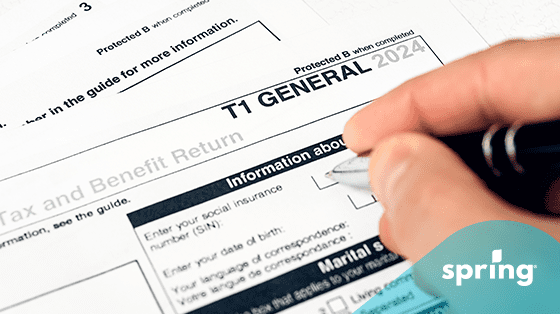That said though, how much are you actually able to give your friends and family before there are tax implications? While this may not be an issue for the odd $50 or even $100, when you start to get into the thousands, that’s when you may start to question it.
While you may not think that gifting money in the thousands is common, it actually is between family members. There are plenty of reasons for this but the main 2 are down payments and college tuition expenses. Let’s take a look at how gifting money, in any amount, works in Canada.
What is Considered Gifting Money?
Before we get too far into discussing gifting money in Canada, we should start by identifying what’s considered to be gifting. Essentially, this means that money is given without anything given in return. If services or products are exchanged, the funds are then considered income and no longer non-taxable.
This counts for any amount of money. Even if you’re gifted $30,000 by voluntary transfer, if there is no contractual obligation in return, then the money is considered to be a gift. This is important to know because it can make a difference in your financial planning.
Are Cash Gifts Taxable in Canada?
When it comes to gifting money, there are no taxes on any amount in Canada, unlike in the US, where you do not have to pay gift tax. Keep in mind, though, that if you’re providing a gift for a certain purpose, you may be required to provide proof of the relationship.
This is most common when gifting money for a down payment for a home. Lenders like to be sure the money is legitimate and from a relationship. The further apart the relationship, the more difficult it may be to gift the money. This is because the funds then seem to be income. In Canada, the tax treatment of income is different than a gift.
Is Gifted Money Tax Free?
When it comes to gifting money, it doesn’t need to be reported to the Canada Revenue Agency, and no gift tax return is required, unlike in the US. The only time you would report gifted money is if you’re donating to registered charities. Usually, when you gift money to a charity, you’re provided with a tax receipt, which you can then claim on your tax return. There are some restrictions to this, though.
In order for charitable donations to be eligible for a tax deduction or to claim tax credits, the money must be given to a qualifying organization. You can check a list that’s available from the CRA. Certain organizations, such as:
- United Nations
- The Government of Canada
- Any province or territory
They aren’t included on the list because they automatically qualify.
The other restriction to consider is your qualifying amount. This is the amount you are eligible to claim up to. Anything above that can’t be claimed. This number is usually somewhere up to 75% of your net income. The only way this amount could change is if you gift capital property, then capital gains are involved.
Tax Implications When Gifting Money for a Home Purchase
In Canada, it’s common for people to gift money to their children in order to purchase a home. With that said, though, it is important that the funds are documented. While they won’t need to be declared for Canadian tax purposes, they will need to be declared in order to purchase a home. Mortgage lenders will need a gift letter for the funds in order to find out where the funds came from.
While the large amount of funds will show up in your bank account and likely be reported to the government if the funds are over $10,000, you won’t be taxed on them. However, it’s very likely that they may ask for proof of where you got the funds from, because anything over $10,000 is considered to be a red flag. It just allows them to verify that the funds are from legitimate sources. usually somewhere up to 75% of your net income. The only way this amount could change is if you gift capital property, then capital gains are involved.

How to Deposit Large Gifted Amounts
Depositing large amounts of money is actually pretty easy. Whether you’re depositing a cash gift, a cheque or getting an e-transfer, you can generally put as much money in your account as you want. That said, though, anything over $10.000 deposited in one day does have to be reported. Just because the money is reported, though, doesn’t mean that you can’t deposit that money.
The most common way of depositing the funds into your account, especially in amounts over $10,000, is by going to the bank and speaking to a teller. They will let you know if there are any processing fees for the deposit, and if you have an account that will allow for the balance. While most accounts don’t have limits, something like a tax-free savings account might.
Generally speaking, though, you should just be able to go into the bank, deposit the outright gift of money and have immediate access to it. Some financial institutions may require proof of where the money came from, while others may just ask. Either way, you should be able to tell them. If you’re depositing a cheque, it’s likely you won’t get questioned at all.
How Much You Can Receive as a Gift in Canada
In Canada, there’s no limit as to how much you can receive as a cash gift. You can receive any amount without it being taxable. It doesn’t matter if the funds come from a family member or not, either. No gifted amounts are taxable. The only exception is if the money is gifted by an employer. Even though there is no gift tax in Canada, for income tax purposes, it’s considered to be income.
Parents and Children: Gifting Money in Canada and if it’s Taxable
When it comes to gifting money from a parent to an adult child, the process is the same as if you were gifting money to any other person when it comes to being tax-efficient. That said, another option is to just deposit money into their account if you have access (joint account) or a bank with the same financial institution. It’s just as simple as giving cash, but without the hassles. Also, this way, nothing has to be done on their end since there’s no tax cost, since the funds are tax-exempt.
If you’re paying tuition, instead of giving them the money, you can also just pay the school directly. For many students, they still fall under their parents’ income and are unable to obtain financial aid, so it’s very common for parents to help with tuition costs. That said, even if the money was gifted to you directly, the funds are tax-exempt according to the tax court so the tax considerations make no difference to how the funds are given.
Gifting Money to Friends
Gifting money to friends is a very simple process. That said though, it depends on the reason that you’re gifting the money and how much you’re gifting. If it’s just a couple hundred dollars then a simple e-transfer is usually the easiest, besides cash.
If you’re gifting your friend a large amount of money for something like a down payment on a home, this is where it might get a little tricky. This is because it may not make sense to a lender why you are gifting them that much money. They usually like the money to come from an immediate family member, like a parent, grandparent, or even a sibling.
They often do allow cousins and more distant relatives to gift the money as well. Most lenders won’t accept a down payment from a friend for a down payment and if they do, a gift letter to prove the relationship is required. This is because you can’t lend money for a down payment; it has to be gifted.
How to Prove that the Money Was Gifted
When you receive money as a gift, most of the time you won’t be questioned unless you are using the money for a down payment on a home. That said, though, if you were, it’s easy enough to prove with a gift letter. If the money is intended to be used for a down paymen,t then it wouldn’t be surprising for the lender to check and see if the person gifting the money has the financial ability to gift that much money.
The thing with gifting money is that, especially for a down payment, it shouldn’t be expected to be paid back. Also, the full amount of the down payment can be gifted as well. The only stipulation is that if you are self-employed, at least 5% of the down payment is required to be paid by you.
No matter how much is required, though, a down payment gift letter is always required to secure the mortgage. This provides validity to the lender that the money will be paid since it won’t show up on any of your bank statements. If you don’t have a gift down payment, you need to show a few months of bank statements in order to prove that the money is in your account.
Are There Any Restrictions on How Much Money I Can Receive?
Just like there are no restrictions on how much money you give, there isn’t a restriction on how much you can receive. This is because the money isn’t considered to be income. Therefore, there are no tax implications for you. It’s important to note, though, that large amounts of money are monitored so they can be reported.
The only time you will find yourself paying tax on money you receive is if you’re paid and there is a contractual obligation on your end. The most common reasons that people deposit large amounts of money are:
- Selling high-ticket items like vehicles
- Gifts from a family member
- Settlements
- Pension payouts
- Medical expenses
The large amounts that are from an employer are considered income and will be taxed.
Gifting Money Through a Will
When creating an estate plan, many family members will often gift money through a will. How exactly does this work and what are the tax implications? Well, the rules about giving money to family members through a will or not are the same. Since there is no gift tax in Canada, taxes do not need to be paid. If there is property involved though, then that’s a different story.
If a property is gifted through a will, then you will have to pay tax upon receiving the gift. These are capital gains taxes and are based on the property’s fair market value. For this reason, some people choose to have the property transferred before their death in order to get the tax benefits. Any property not sold before death also has to be claimed on the deceased person’s final tax return and is considered to have disposed of all their property. This is known as a deemed disposition.
With a will, it’s common to get gifted a combination of money and property from a deceased individual. A lot of times, these can come from a trust fund. There are two kinds of trusts: irrevocable trusts and revocable trusts. The difference between the two is that an irrevocable trust can’t be altered, while a revocable trust can.
When it comes to receiving money or property, there are probate fees that have to be paid, but there is no estate tax. Estate taxes don’t exist in Canada, but the executor of the estate will have to file taxes for one final year on behalf of the deceased person. You can also find a lot of this information in the Income Tax Act.
Gifting Assets in Canada
If, instead of gifting money, you choose to gift assets like personal property, then there will likely be tax consequences, according to tax rules, depending on the person’s relationship to you. For instance, when you gift capital property, it’s considered to be sold at fair market value.
This means you would still need to pay capital gains amounts on your income taxes. However, there are some stipulations to this since you don’t pay capital gains realized on your family home, also referred to as a principal residence.
When it comes to gifted property, there are a lot of different aspects to consider. You need to consider that when you gift to a family, attribution rules apply, and they will get any future gains from the property gifted.
You also need to consider if the person you’re gifting the property to is considered to be non-arms-length in relation. Gifts to common-law partners (spouse transfers), children, and other direct relations are considered to be at arm’s length.
Taxes on Gifting Property at an Arms Length Relationship
In Canada, if you gift a property while you’re still alive, it could qualify for the Principal Residence Exemption. This means that the relative you’re gifting the property too is going to and still lives there, and in just taking over ownership of the property. In this case, it won’t be deemed to be sold at fair market value and their won’t be an taxes.
This type of transaction is very common with farmland that is passed down from generation to generation. It’s also commonly done with spouses and different generations with other types of property. The main reasoning behind this loophole is to keep property in the family. Depending on how the will is made, though, there could be estate fees if the property is gifted in the will instead of before death. It’s best to speak with both an estate lawyer and a tax professional to discover the best way to set this up. This is especially the case when the gifted property exceeds a certain value.
Things to Consider
When you gift property in Canada, it’s not just capital gains you need to consider but capital losses as well, especially if this is another property that isn’t used as a principal residence. As we’ve already mentioned, even if you gift the property, it will be considered to be sold for fair market value, which doesn’t always mean that you’ve accrued gains.
If you haven’t deemed proceeds based on the FMV of the property, then you could clcapital costital allowance. This would allow you to claim any expenses incurred on the property as well as the depreciation. However, with such gifts, any proceeds received from the property sale by the owner would not be split between you and the person you gifted to. Legally, these would be theirs alone, and they would pay any taxes associated with the sale.
In the gifting process, expenses will also likely be incurred. This is because there will be transfer fees and other fees associated with the transfer.
Gifts From Employers
In Canada, when you receive a gift from your employer, whether these are certain non-cash gifts or not, it’s likely that this gift is taxable. There are some exceptions when the employee is considered to be at arm’s length, but in most cases, these amounts are considered to be a taxable benefit. That said, there are corporate rules in play to avoid double taxation.
Is it Better to Gift Cash or Assets in Canada?
While you can gift both cash and assets in Canada, you’ll likely have to pay tax on the assets, whereas there are no taxes when you gift cash. However, sometimes it may be worth it to gift the asset instead of the cash. It’s important to remember that the recipient isn’t given an asset; it’s the person who gives the gift.
As the recipient of either kind of gift in Canada, you don’t have to worry about any tax repercussions. However, if the asset comes with monthly or annual taxes of any kind, then you still have to pay those. Any lawyer or contract fees will also have to be paid. These fees are normally part of the adjusted cost base of the property.
Ways to Gift Money in Canada
While money can easily be transferred from one account to another, there are other ways to gift money. A common way for parents to gift money to their children is through a Registered Education Savings Plan.
Just like with other forms of gifting, there’s no tax burden on the funds since they aren’t considered taxable benefits. The funds also aren’t considered taxable income, so income tax doesn’t have to be paid on these funds. Like with other types of registered accounts in Canada, the money can also grow tax-free.
Other accounts you can gift money through are Tax-Free Savings Accounts and even Registered Retirement Savings Plans. With RRSPs, the most common way of gifting money is through spousal RRSPs. These can also be used for income splitting according to income attribution rules. Based on your tax situation, it can also help bring you into a lower tax bracket, which also helps reduce your tax burden.
No matter which way you choose to gift money, it could be beneficial to speak to a tax advisor. While there’s no specific gift tax, a tax advisor can help you find the best options for your employment or business income and make the best choices for your financial future.
Conclusion
Gifting and receiving money are common practices in Canada. Many people prefer it over other gifts. It’s also one of the main reasons that so many people use Interac e-transfer. While most large gifts come from immediate family members, they can come from friends as well.
The only time that gifting gets tricky is when it comes to down payments for a home. Other than that, there really are no restrictions when it comes to gifting, making gifts of cash easy to give. Depending on how you receive the money though, it’s always beneficial to ask for tax advice to ensure you are making the right decisions.








